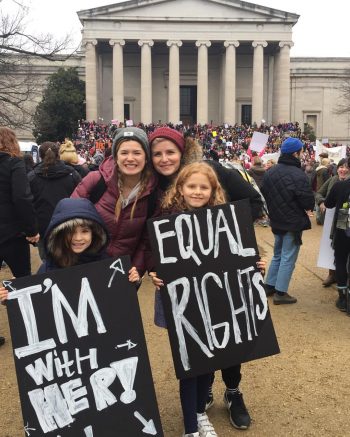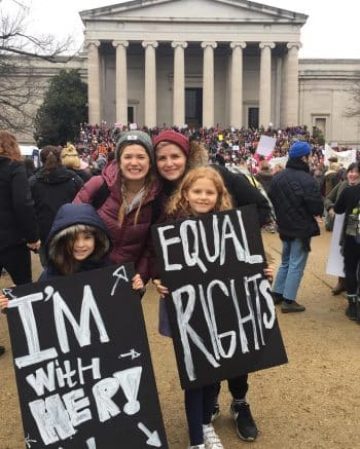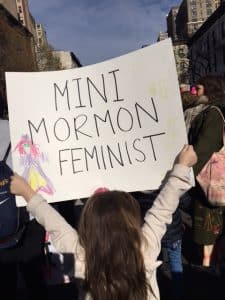 by Linsey Laidlaw
by Linsey Laidlaw
Dear Ms. Dalton,
(The traditional title of “Sister” doesn’t feel apt at present.)
I am writing in response to the Desert News piece which cited a quote about your trip to New York during the Women’s March. My heart sank reading your words.
Your implication that the women who marched in NYC and elsewhere are not virtuous is deeply offensive, and I’m appalled by your lack of sensitivity. Even more though, I am surprised by the ignorance of such a statement from a woman who has been in a worldwide leadership position, overseeing young girls of many nations, including those who live in countries who have been abused by the new president’s rhetoric.
My husband, son, youngest daughter, sister, and nephew were among the protestors in NYC that day. I was marching in D.C. with my older daughter. Countless friends, many Mormon, many Jewish, Muslim, Catholic, Christian, Hindu, or non-religious marched with us in these cities and more around the world. From the bottom of our hearts and souls and very tired feet, we absolutely did march for a return to virtue.
You and I seem to espouse different definitions of virtue. You: the septimal denotation of chastity (especially in women, as Merriam Webster clarifies, a qualification on which you appear to concur); I: the primary— “a conformity to a standard of right, a particular moral excellence.”
If you had been truly present at any of the marches, in NYC or elsewhere, instead of an unctuous onlooker, you would have been unable to deny the moral excellence that defined the day. Women, and men, of all ages, races, classes, and personalities came patiently and lovingly together to stand boldly against the harmful words and actions of the new administration. We hoisted the wheelchairs of disabled sisters, held and comforted babies for mothers, gave seats to the tired, invited people in lines ahead of us, shared snacks, medicines, supplies and words of comfort. We arrived as strangers, and united there as friends and allies. Harmony is a saccharine and somewhat dramatic word—but it is the only one that accurately captures the energy and outcome of the marches around the world.
Perhaps you were alarmed by the use of the word “pussy”, or other reference to female genitalia? Is this unladylike, to quote the man America elected to it’s highest office? What is it when a man says it? As I explained to my eight-year-old daughter as we navigated the sea of signs, many referencing these words—Our new president has spoken about women in extremely derogatory ways. His disrespect for women (and history of sexual assault, which I didn’t mention to my daughter, but I’ll throw in for your reference as you seem to have forgotten) is of great concern, and it’s very important for us to confront this directly and not gloss over what he has said with generalities or euphemisms.
There is power in strong words, which is why Donald Trump said the things he said—to project power and strength. Which is why many women are choosing to reclaim those words—recouping that power in a united show of strength. And which is why the words you speak as a leader in our faith must be better informed and considered.
Is it not virtuous to demand equal treatment as women? To denounce sexual violence and objectification of our bodies and spirits? Is it not virtuous to call for equal treatment for people of color, to affirm that their lives matter? Is it not virtuous to insist upon freedom for out Muslim brothers and sisters, and people of all religions? Is it not virtuous to cry out for taking in and protecting refugees—victims of war—a large percentage of whom are children? Is it not virtuous to stand up for our Latin American neighbors, and seek to protect their families from being ripped apart, or does the call to “responsible citizens and officers of government everywhere to promote those measures designed to maintain and strengthen the family as the fundamental unit of society” not apply to families with brown skin? I’m pretty sure I know where you stand on our LGBT brothers and sisters, but what of defending the earth? Have we not been charged to be good stewards of this sacred inheritance? What about the poor and needy? Wasn’t their care paramount to Christ in his mortal ministry?
In the rankings of commandments, Jesus taught that loving God was the first and greatest. “And the second is like unto it: ‘Love your neighbor as yourself.” The women’s march was among the very greatest displays of this mandate I have ever witnessed. What would happen if women in your capacity called for the Mormon world to understand this and start pulling their weight?
Linsey Laidlaw is a designer and art director who lives with her three kids and husband in Brooklyn, NY.






19 Responses
Linsey, Thank you so much for writing this and sharing it. I’m honored to have marched in NYC alongside your husband, son, youngest daughter, sister, and nephew. Their signs were my favorite, especially the ones honoring Heavenly Mother and the earth, respectively. I was also inspired by your children’s patience and your husband’s forethought in (tons of) carried snacks.
I’m grateful that you marched in D.C. with your oldest daughter and the many, many others. I also love the descriptions of the care and community you experienced. They resonate so closely with my own. And yes, “From the bottom of our hearts and souls and very tired feet, we absolutely did march for a return to virtue.”
Bless you, SISTER Laidlaw. And amen to every righteous word of this. My experience at the D.C. March was exactly as you described and was one of the most spiritually edifying and important experiences of my life. I earnestly hope our church leaders read your letter. Thank you for sharing it here.
“From the bottom of our hearts and souls and very tired feet, we absolutely did march for a return to virtue.” Yes! This! Thank you for sharing.
Yes. This.
I’m very concerned about the tendency within Church leadership (and former leadership) to dismiss the ways in which we call for virtue, charity, and Christlike love.
Thank you for marching! Thank you for putting Christ-like behavior over Dalton’s version of ladylike behavior.
Amen!!
My experience was very much like yours, Linsey. Seeing so many men, women, and kids of all different ethnicities — including our dear Muslim sisters in their headscarves — marching for compassion, equality, and care for the earth was one of the best experiences of my life. After feeling such fear as this new administration took power, I felt hope again at this march. My one regret was that I did not take my three young children. How I would have loved for them to participate and see firsthand what democracy looks like and to feel what it’s like to do one’s part in calling for a more compassionate — and yes, virtuous — future.
I felt big hope that day, too, for the first time in a long time, and also wish I brought my children.
Can the people say ‘amen’? AMEN!
So, if women were to be ordained, and it came time to replace a member of the Quorum of the Apostles, I am guessing Sister Dalton would not be top of anyone here’s wish list.
Thank you for writing the letter I wanted to. I agree with every word you wrote and was marching in Portland, Oregon. If Mormon women can’t unite over sexual abuse, what can we unite over?
Would the women also have marched on Bill Clinton if he moved back into the White House? His actions were every bit as disgraceful, if not worst. His vocabulary, although not recorded was probably demeaning of women. I still picture in my mind what he did to a young Monica in the Oval Office . Both men’s actions were horrible as was John Kennedy’s. But let’s make sure that our outrage is not just along political lines. It seems both parties are able to turn a blind eye when it suits their agenda.
Of course. You’ve presented an important perspective. Thank you. But let’s not lose the opportunity to kindly see one another as sisters, especially through disagreement.
Ms. Dalton? Seriously? I would expect that from someone who has never been or no longer is LDS and hopefully that’s the case.
Anyone that knows Sister Dalton personally or has ever heard her speak would agree that she doesn’t deserve that disrespect.
She is a kind soul with a good heart. She meant no harm to the marchers as a whole, but was definitely affected by the ones she saw and heard.
I especially appreciated this part:
Is this unladylike, to quote the man America elected to it’s highest office? What is it when a man says it?
When people rebuke women on the basis that their behavior was not lady-like, they are excusing men who have the same behavior and enforcing a double standard. In this case, it is particularly ironic, because marchers didn’t like those vulgar terms and wouldn’t have said them, if they hadn’t been quoting Trump and calling attention to his vulgarity.
Yes. Amen to all of this.